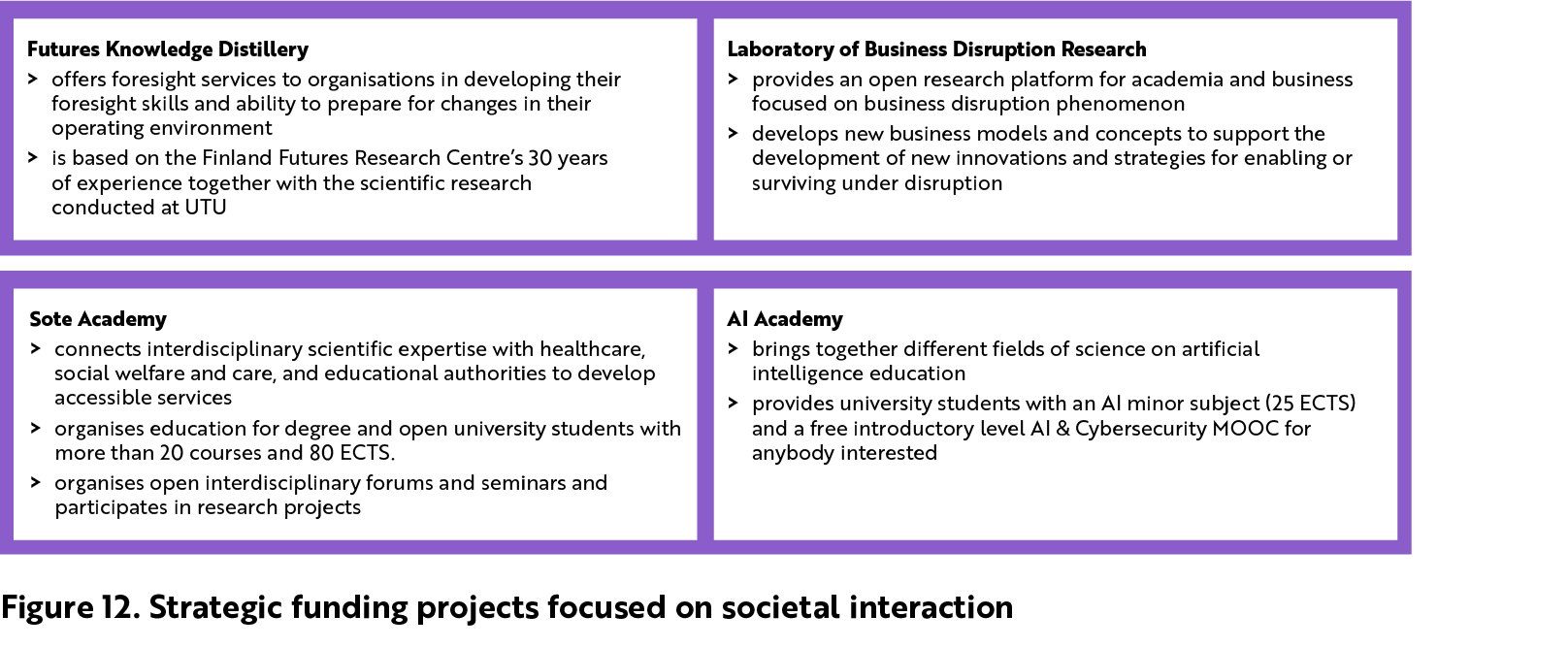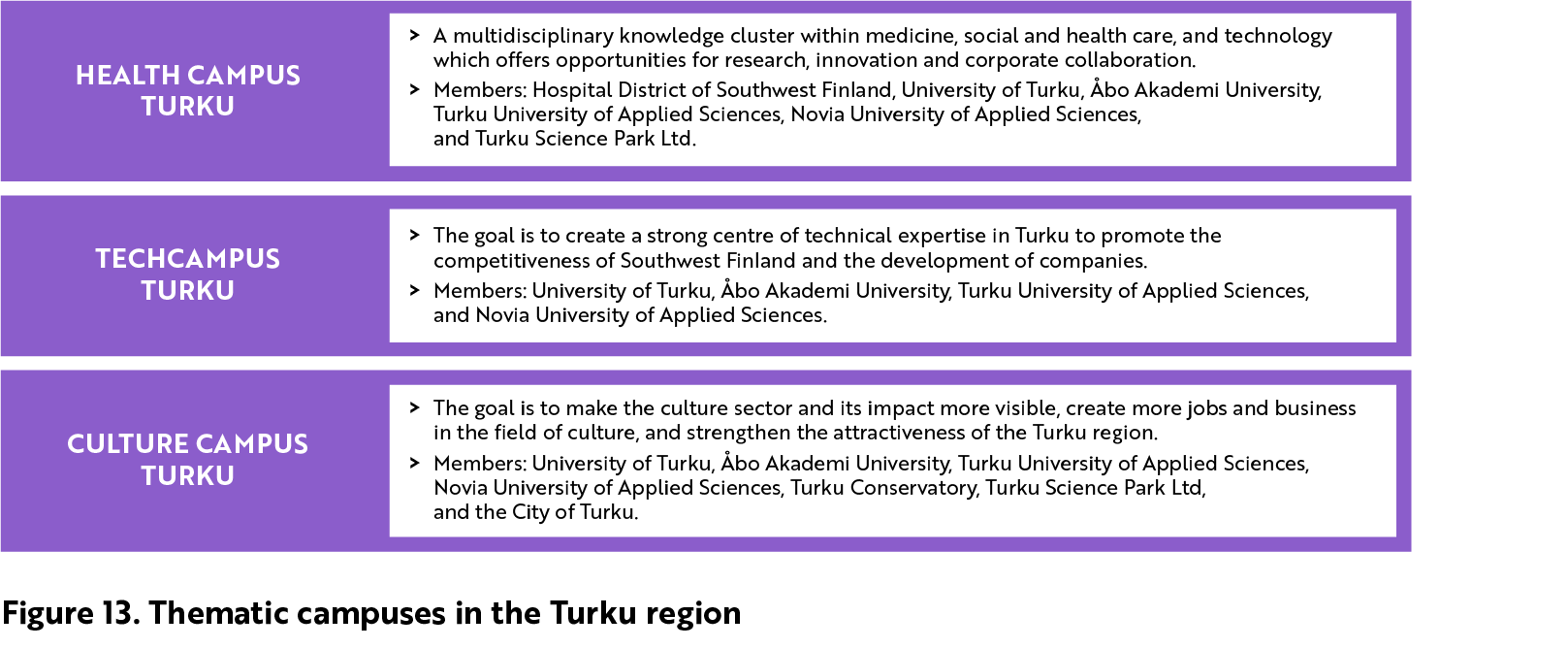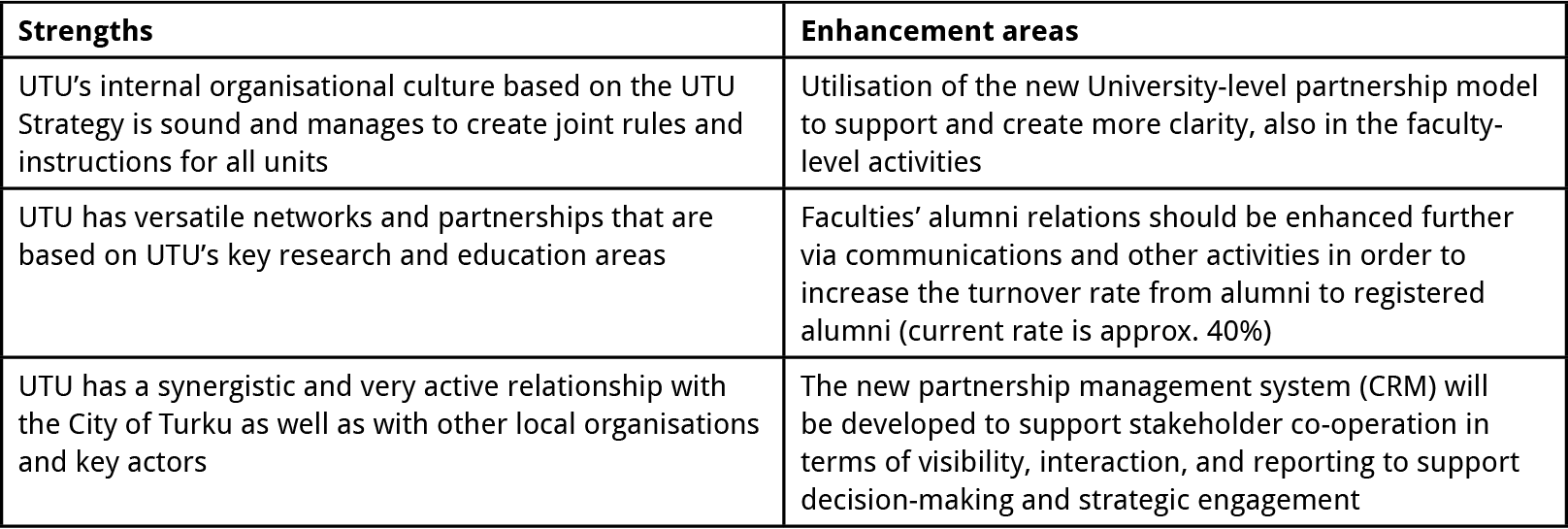Innovative work and co-operation to support renewal
Based on the value of creativity, UTU encourages UTU community members to seek new and innovative perspectives and try new working methods. Also, the Principles and Practices of Leadership at UTU promote the renewal and culture of innovation and experimentation in order to aid the realisation of the Strategy and the Personnel Policy.
On the University level, enhancing innovative culture includes providing infrastructure, such as spaces for teaching technology experimentation and collaborative spaces for the UTU community and stakeholders, as well as social recognition, moral support for leadership, and financial resources, such as internal strategic funding. Also, the University Services support multi-disciplinary networking and aid the flow of information and good practices between units. This takes place via dedicated initiatives (see chapter 3.2), voluntary and leadership training, and supporting the creation of informal peer groups.
The University wide strategic projects (Figure 12) have been especially successful in utilising the diverse expertise within UTU in order to create new solutions based on multidisciplinary co-operation which are appropriate to UTU’s profile. The projects also allow learning and experimentation in the interface with the customer and stakeholder creating benefits also for them.

Outside the strategic projects, UTU encourages faculties to implement outreach activities together with stakeholders. One example is the Corporate Corner, a multi-disciplinary innovation and collaboration platform that provides opportunities for companies and UTU experts to network through tailored events. Overall, external expertise is critical in order to promote renewal at UTU. For example, by appointing professors of practice, UTU has been able to involve people with the kind of expertise society needs as teachers and research supervisors.
Based on the value of openness, students are engaged in the preparation and key decision-making at UTU. UTU also wants to inspire students and offers them a focused grant for entrepreneurial projects to test and pilot new ideas.
Collaboration and co-development in long-term and goal-oriented partnerships
UTU values close collaboration in regional, national and international networks and engages in long-term and goal-oriented partnerships to strengthen UTU’s societal impact in education and research.
The six strategic research and education profiles of UTU strengthen internal collaboration and create platforms for networks, business collaboration, innovations, and strategic partnerships. The work conducted within the profiles advances sustainable development, decision-making based on researched information, application of expertise, and other societal impact of research. In several of the strategic profiles, UTU collaborates closely with important HE partners Åbo Akademi University and Turku University of Applied Sciences.
UTU operates within three thematic campuses (Health Campus Turku; TechCampus Turku; Culture Campus Turku) in Turku that bring together the expertise of HEIs and the local development company Turku Science Park for the benefit of the region’s business (Figure 13).

At the end of 2022, UTU introduced a Code of Conduct for Strategic and University-level Partnerships. In accordance with the policy, UTU seeks partnerships with individual organisations that have regional, national or international influence in order to support sustainable growth, competitiveness and well-being through all activities. The strategic partnerships are formed so that multidisciplinary cooperation is conducted preferably with all UTU’s faculties, while in the University-level partnerships the co-operation is more limited in terms of disciplines. The current strategic partners include Bayer Nordic SE, Meyer Turku Oy, Wärtsilä Finland Oy, and the City of Turku.
Faculties, departments and research groups have extensive co-operation with domestic and international stakeholders in different fields (such as private, public and third sector organisations as well as individuals in different roles). They operate independently in forming these partnerships and related agreements while ensuring that they are appropriate to UTU’s profile and support the realisation of the Strategy. However, they are supported by the Partnerships and Strategic Engagement.
International collaboration is essential in achieving UTU’s strategic goals. The International Programme of UTU outlines key measures for increasing and improving quality, productivity and impact in all three missions. The Programme ensures internationally high-quality research and education, increases UTU’s attraction, strengthens partnerships that promote responsibility and sustainability as well as communality and multiculturalism. The most essential long-term networks are EUA, EC2U Alliance (European Universities Alliance) and the Coimbra Group. Also, UTU coordinates two of the eight strategic Global Networks of the International Programme of the Ministry of Education and Culture. UTU has been a long-term member in international education-related networks, such as EUCEN. On the other hand, UTU actively seeks new strategic networks. Currently, it maps international networks for research impact.
Supporting current students as future alumni and the existing alumni community is a part of UTU’s societal impact. Alumni are provided with access to events and continuous education in order to help them adapt to an ever-changing society. In return, they can contribute to education by participating in the teaching and motivating current students. Alumni are invited to plan alumni activities and give feedback about their experiences of working with UTU through surveys, alumni events and by sharing information about currently needed working life skills. In addition, notable alumni are important in terms of promoting the reputation of UTU.
UTU manages partnership agreements in the ASTA Case Management System. Partnerships management is supported also by the CRM system which is currently being developed to support stakeholder co-operation even more efficiently.
